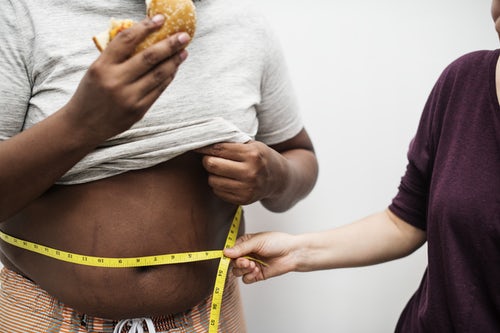Many years ago, when I was in college, a sorority sister asked me how I managed to lose so much weight. “By starving,” I said (sarcastic chuckle included). “How else?”
My response was only a little facetious, and definitely rhetorical. She nodded in understanding.
All my nutrition training told me that was the wrong way to go about it; that starving was dangerous and counter-productive. To lose weight you just needed to increase your exercise (as a Physical Education and athletic training major I was already doing quite a bit of that); and reduce your calorie intake a little. (I hadn’t been doing that. In fact, I was consuming far too many calories for my activity level.)
And, of course, when I did restrict my calorie consumption, I wasn’t starving myself entirely. I usually enjoyed dinner with my sorority sisters at the house and substituted Diet Pepsi for other meals. Gobs of it. Definitely an unhealthy thing to do. (I was usually in too much of a hurry to take time to eat breakfast.)
Research now shows—and more professionals are recognizing—that “starving” or severely reducing your calorie intake or fasting one to times a week is beneficial.
But there are researchers that have supported this conclusion for some time.
Some fasting and limited calorie consumption history—
When I was working in Southern California in the 80s and 90s, a researcher at nearby Loma Linda University was studying the effects of fasting and severely reduced calorie consumption, to a point where he said that you really end up feeling hungry most of the time. He believed, for a variety of reasons, it was healthier for the body to run in short supply. He also thought it would lengthen your life span.
Then the University of Wisconsin (my alma mater) did a longitudinal (17 years, I believe it was) study using monkeys (one of their favorite subjects) on calorie restriction versus the unlimited, unrestrained, smorgasbord eating approach.
What they found was fascinating.
Some monkeys were allowed to gorge themselves on as much food as they wanted, without restriction. Other monkeys were put on restricted-calorie diets. They only ate what was put in front of them; and the calories were less than what one would expect them to be for a healthy monkey’s daily calorie count. Both groups had access to activity or exercise.
Well, what do you think happened?
They showed side-by-side pictures of two monkeys, one on the restricted diet and the other on the smorgasbord. Both monkeys were similar age. But they certainly didn’t look as though they were!
The limited-calorie monkey looked lean and healthy, with a youthful body and face. His hair was thick. He was energetic. And he didn’t have any of the diseases that “normally” come with monkey age.
On the other hand, the smorgasbord monkey was fat and lethargic. Evidently he lost interest in exercise and spent most of his time lolling about in his living quarters, even when given access to exercise. His fur was sparse and grey; he was jowly, with fat accumulation around his face. He looked downright miserable and sad. And he had a lot of medical problems.
Did the calorie-restricted monkey live longer?
Nope. But he lived BETTER! He lived with health and vigor until the end came. Mr. Smorgasbord progressed miserably. Death swallowed him faster and more decisively than Mr. Lean.
Now we’ve come to a point where researchers believe that Intermittent Fasting (IF)— eating very little, or nothing, for a couple days a week—leads to weight loss. Weight loss that lasts. It also provides a heap of other benefits too:
- Protection from heart disease
- Protection from cancer
- Reduction of blood pressure
- Decrease in diabetes
- Improved brain health
- Enhanced physical fitness
- Possible breast cancer reduction
- Increased stress resistance
- Reduction in inflammation at the cellular level
So exactly what is intermittent fasting?
Intermittent Fasting (IF) is an eating schedule that incorporates regular periods of low or no food consumption. (We’ll get to the optional techniques in a bit.)
Scientists believe it works because it may shift a person’s cellular and metabolic process in health-promoting ways.
One significant finding is that when the IF diet is pitted against a daily calorie restriction diet, the IF approach wins. People lose more weight with intermittent fasting. And it’s easier to adhere to because people enjoy and find more success with it.
IF also outperforms other, more traditional diets in several ways:
- weight loss
- body fat reduction
- improvement in insulin resistance
Intermittent Fasting techniques—
There are several approaches to intermittent fasting.
The first is called the 5:2 approach. The 5:2 is when you eat normally for five days a week and then fast or eat reduced calories on two other days of the week. The two days can be separate or back-to-back.
Fasting every other day is another method.
And then there’s the Time-Restricted fasting, where you only eat in a narrow window of six to eight hours.
In either the 5:2 approach or the Fasting every other day method, your fast day calories should not exceed 500 calories. And those 500 calories should be:
- healthy fats—avocados, oils, fish, nuts
- protein—eggs, fish, nuts
- No, or minimal carb, ingestion is allowed
Mark Mattson, Johns Hopkins School of Medicine neuroscience professor compares the IF effect to exercise stress. Intermittent Fasting stress appears to trigger similar adaptations.
“These cycles of challenge, recovery, challenge, recovery seem to optimize both function and durability of most cell sites,” he says. (Special TIME Edition, 2019. “What Is Intermittent Fasting and Is It Actually Good for You?” Markham, Heidi; page 20)
What they don’t yet know the answer to is how normal-weight people might fare with or benefit from IF. And are there long-term risks.
Based on the University of Wisconsin research, I would take an educated guess and say that benefits would outweigh the risks, if you paid attention to what a healthy weight is for you and tweaked your needs accordingly.
Mattson recommends the 5:2 approach because it’s been studied the most.
And then there’s the Keto diet—
This IF fasting is similar to the Keto diet in terms of food ingested on fasting days: healthful fats, proteins and very few carbs.
The idea with the Keto diet, though, is that you force the brain—which normally runs on carbs only—to use the protein and fat in your diet. To give you a basic biochemistry overview, it happens like this:
Carbs are C-H-O structures (CHO)—carbon, hydrogen and oxygen
Proteins are C-H-O-N (CHON), with the nitrogen component on the end.
When you don’t consume carbs, the body can break off the nitrogen component of the protein and make it look like a carb. So when a lot of protein is consumed in lieu of carbs, the body can make a carb.
Consequently, when someone is in deep starvation, the body will actually cannibalize its own muscle tissue for the protein to make energy for cell metabolism.
But the fats are the key.
When fats are consumed, the metabolic process breaks the fatty acids down into what are known as ketone bodies, produced by the liver. The brain, heart, liver and muscles can run on ketone bodies. This metabolic process occurs during:
- low food intake
- carbohydrate restriction
- starvation
- prolonged intense exercise
- alcoholism
- untreated type 1 (juvenile) diabetes mellitus
When you read the above list, you can see four factors listed that we’ve been talking about: low food intake, carb restriction, starvation (perhaps intermittent fasting) and prolonged exercise. Although you don’t have to engage in prolonged intense exercise to reap the benefits of IF.
What food can you eat on the non-fasting days?
Does fasting two days a week mean you can go hog wild on the freebie days?
No. You’ll still want to consume healthful foods, but you can add some carbs to satisfy your “sweet” food cravings. And you probably won’t need to pay as much attention to the calorie consumption.
What about those annoying hunger pangs?
Mattson says you can expect hunger pangs the first month, while your body and brain adapt. So hang in there!
Is Intermittent Fasting a quick fix?
IF is not the quick fix everyone hopes for. I don’t think one of those exists. You can’t continue to consume an overall crummy diet or maintain a sedentary, indulgent lifestyle and expect miracles from two-day a week fasting.
And if you are obese, make sure you consult your physician before embarking on any new eating plan.
NEXT WEEK I’ll tell you some stories on how intermittent fasting can balloon into an eating disorder and go awry!
Until then,
Enjoy the good food God has given us for our pleasure and health, and give IF a try. You’ll be surprised at how much more energy you have and how much better you’ll feel as you help rid your body of excess calories and toxins.
Blessings,
Andrea
“Certainly there was an Eden….We all long for it, and we are constantly glimpsing it.” —J.R.R. Tolkien



